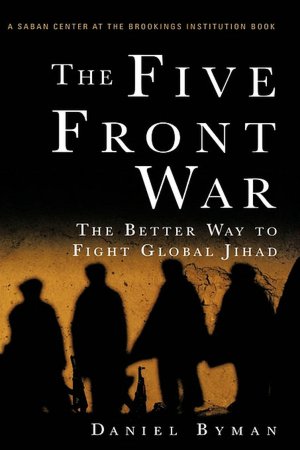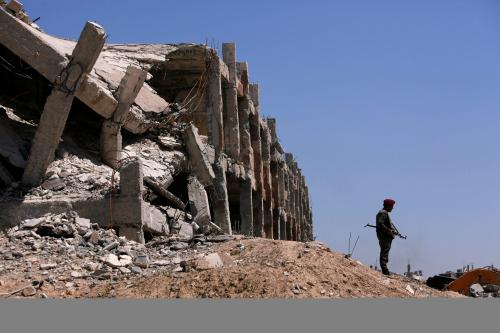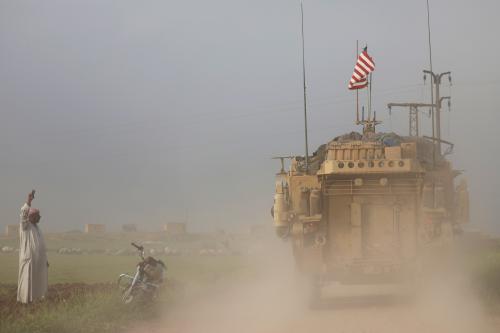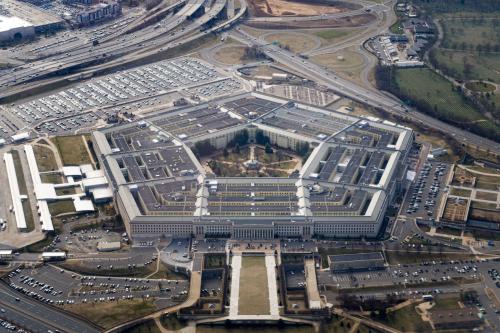Trump’s betrayal of the Kurds certainly didn’t help the fight against ISIS. But we shouldn’t assume the group will come roaring back, writes Daniel L. Byman. This piece originally appeared in Slate Magazine.
When President Donald Trump announced the withdrawal of U.S. troops from northern Syria last week, tweeting “The Endless Wars Must End!,” the gates of hell seemed to open. Trump effectively greenlighted the Turkish invasion of territory controlled by the Syrian Kurdish–dominated Syrian Democratic Forces—the most effective U.S. ally in fighting ISIS, having sacrificed thousands of its own members to subdue the group and currently holding thousands of ISIS prisoners.
The troops’ removal has led to warnings that ISIS will return to its glory days and restore the caliphate. Sen. Lindsey Graham, usually a Trump ally, warned, “The reemergence of ISIS is on the way. And if you think only Europe is threatened—you are sadly mistaken.” Intelligence officials, more carefully, seem to share the same opinion. During Tuesday’s Democratic primary debate, candidate Pete Buttigieg also warned that Trump’s decision would lead to a “resurgence of ISIS,” a sentiment shared by other candidates.
The small U.S. troop presence was aiding the SDF in fighting ISIS, in part by deterring Turkey and the Syrian regime from taking over the SDF-controlled territory, which enabled the SDF to focus on the jihadis. Although Trump claims, “We defeated 100% of the ISIS Caliphate,” and ISIS has indeed lost nearly all of the territory it once controlled, the group has in fact returned to its insurgent roots, with thousands of fighters still operating in Iraq and Syria. “Down but not out” is a favorite description from experts. But are we really primed for an ISIS comeback?
Events on the ground would appear to justify the concerns. The Kurds are claiming that hundreds of ISIS prisoners have already escaped in the chaos that accompanied the Turkish invasion, though it is not clear how many of these are the family members of fighters and how many are truly dangerous individuals. Because the U.S. withdrawal happened with no planning and coordination, the United States was not able to retain control of several dozen high-value ISIS fighters, raising the risk that some of the most dangerous operatives will go free. For ISIS, prison breaks are vital, as they are desperate for experienced fighters.
Indeed, its “Breaking the Walls” campaign in 2012–13, when it freed hundreds of hardened fighters from prisons in Iraq, was a key prelude to the building of the caliphate, allowing the group to bounce back from a devastating U.S. counterterrorism campaign conducted before U.S. troops departed Iraq in December 2011.
ISIS will also get a boost as its No. 1 enemy in Syria, the SDF, faces mortal peril. The overwhelming threat Turkey poses will force the SDF to focus its energies against Ankara. ISIS, especially in its depleted condition, is far less dangerous to the SDF, and with no U.S. firepower and other assistance to help, there is even less incentive to focus on this danger.
Turkey’s policies are a key question. In the past, Turkey tolerated the flow of jihadis into Syria, hoping their presence would undermine the Assad regime. In 2015, after U.S. pressure and a spate of terrorist attacks in Turkey itself, Ankara began to close the border and otherwise stepped up its efforts against ISIS, but there is still a large ISIS presence in Turkey itself. As its invasion suggests, Turkey prioritizes what it sees as a Kurdish threat, and it is willing to tolerate a greater danger from jihadis in order to counter its traditional enemies. So, Ankara has incentives to act responsibly, but its record suggests it might not do so, or at least not to the extent Washington would wish.
Still, while the U.S. troop withdrawal obviously helps ISIS, it is far from clear that the terrorist group will roar back or return to its glory days of 2014–15. Although ISIS may not be “100% defeated” as the president claims, it has been hit hard. In addition to losing thousands of fighters in its battles to preserve its territory, the loss of the caliphate robbed the group of one of its greatest recruiting assets and sources of revenue. Similarly, it no longer was able to portray itself as a winner, another blow to its prestige. In part due to this decline, ISIS-orchestrated or inspired attacks in the United States and Europe have fallen dramatically in recent years.
It’s hard to feel good about putting U.S. counterterrorism in the hands of Syria and Russia, but they too are foes of ISIS. Although the Assad regime tolerated the group as it emerged and used it in its propaganda to rally world and domestic opinion behind the regime, the Syrian military has also fought ISIS regularly and considers the group a bitter enemy. Russia too faces a massive jihadist problem—volunteers from the Caucasus are one of the most important components of ISIS—and wants the group members dead.
Perhaps most important, even with its ranks refreshed by released prisoners and SDF pressure gone, any haven ISIS would enjoy in 2019 would be a shadow of the one it enjoyed at its peak in 2014–15, when it seized swaths of territory in Iraq and Syria, orchestrated attacks in Europe, and otherwise seemed to be taking on the world. At that time, the Syrian regime focused first and foremost on the more moderate opposition, giving ISIS a relatively free hand in what it saw as remote parts of the country. Now that the Syrian regime has the upper hand, it is more likely to concentrate on ISIS. In 2014, the Iraqi government was overly hostile and discriminatory toward its Sunni community, giving ISIS fertile ground for recruitment. Today, the Iraqi regime is both less discriminatory and has a far stronger presence (often backed by Iran and Shiite militias) in Sunni areas. Although the United States is withdrawing from Syria, it still has troops in Iraq, and from there they can strike at ISIS bases in Syria.
Much depends on Turkey, Russia, and Syria and on the follow-on policies of the United States itself. If Washington works with Turkey and pushes it to prioritize ISIS, and if administration officials stress counterterrorism in talks with Russia, then at least part of the problem will be solved. In addition, the United States could also strike ISIS directly, using drones or raids by special operations forces, and otherwise not allow it to establish large-scale training camps or other infrastructure.
Unfortunately, the Trump administration’s bungled withdrawal from Syria suggests none of this will go smoothly. The United States is not likely to try to negotiate or coordinate with allies or do more than bluster via tweet. So, when trying to anticipate how much the U.S. withdrawal will benefit ISIS, it is best to assume that any successor policies will be improvised, uncoordinated, and lacking staying power. Should a new administration take office in 2021, reversing course in Syria will have to be one of its top priorities.
The biggest danger to the struggle against ISIS and for U.S. national security in general is a long-term one: the collapse of U.S. credibility with allies. This problem goes well beyond Syria, with the Trump administration criticizing Australia, South Korea, France, and other long-standing U.S. partners while seeming to coddle foes and rivals like North Korea and Russia. Abandoning the Kurds, and doing so with no notice, is symptomatic of the Trump administration’s disdain for allies, even those who are fighting and dying to keep America safe. Even the few supportive allies, such as Israel, are questioning the president. Although a new administration might try to reverse course, allies now realize that U.S. policy can vary dramatically with a change in administration and will hedge accordingly.










Commentary
ISIS reborn?
October 21, 2019